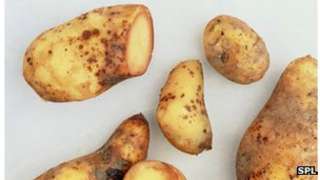
Image caption Blight turns potatoes into mush
Ireland’s environmental protection agency has approved the first trial of a genetically modified potato crop.
Scientists say the plants have been designed to improve resistance to blight.
They argue that the type of genetic modification used is akin to conventional breeding.
But the decision has been severely criticised by campaigners who say that there will be “grave ramifications” for the country.
Late blight is sometimes said to be the most dangerous potato disease in the world. It can rapidly turn the vegetable into an inedible mush.
In recent years, more aggressive strains of blight have become prevalent, resulting in a chemical arms race as farmers and growers seek to kill the fungus with ever more powerful sprays.
The financial cost in a country like Ireland is estimated to be 15 million euros each year.
Since 2010, the European Union has been trialling genetically modified potato plants at a number of locations in the UK, Belgium and the Netherlands.
Now Ireland has given the go-ahead for a two-hectare trial site that will see how the GM potatoes cope with less anti-fungal spray than conventional varieties.
Reputation at risk
John Spink is head of crop research at Teagasc, the Irish food development authority that has applied for the licence.
“We need to do this trial in Ireland because our environment is different from other parts of the EU,” Mr Spink told BBC News.
“It’s not about commercialising GM potatoes. We’re looking at impacts on the environment and on the pathogen itself.”
But campaigners believe that the trial is risking Ireland’s reputation as a green, clean food-producing island.
The Organic Trust in Dublin says that this approval has “grave ramifications for Irish food and farming”. The Trust’ s Gavin Lynch says that this will be the first GM trial since 1996 when a previous attempt at growing GM sugar beets was discontinued.
“Ireland’s status as a GM-free country is being risked here,” Mr Lynch told BBC News.
“It’s only a two-hectare trial, but that’s like saying you’re only a little bit pregnant, there are no grey areas with GM.”
Scientists at Teagasc say that the trial will use what is known as cisgenic technology to modify the potatoes. They argue that the technology is more similar to conventional breeding than to the more widespread “transgenic modification”, which incorporates genes from an entirely different species.
In the case of the potatoes that will be trialled, they contain a resistance gene taken from Solanum venturii, a wild south American relative of the potato.
High-speed breeding
“You could achieve the same results by conventional breeding,” said Mr Spink, “but it might take 15-20 years – this way we can do it in weeks.
“And it allows us to target the genes we want; conventional methods would bring in other genes that you don’t want or need.”
But anti-GM campaigners in Ireland are not convinced that the cisgenic technique is benign.
“It is portrayed as ‘GM-lite’ – but in reality cisgenic is a nonsense,” said Mr Lynch.
“It is just there to make GM more palatable to the general public. The fact that it comes from a related plant doesn’t make it any different. The real danger is the process.”
This view is echoed by Stella Coffey, a campaigner who runs a blog called GM Moratorium , describing herself as a grandmother and biotech sceptic.
“They haven’t researched other options – it’s absolutely preposterous to use such a risky tech as your first line of action. It’s one of the biggest cons that has been perpetrated by regulatory science in a long time.”
The trial is set to run for four years. Consent has been granted subject a number of conditions and reporting requirements.
GM potato trial ‘threatens Ireland’s image’ have 662 words, post on www.bbc.com at 2012-07-27 16:38:01. This is cached page on WBNews. If you want remove this page, please contact us.
